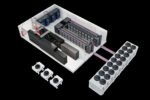
Saudi Electricity Company (SEC) embarked on a large-scale project to replace its aging desktop computer environment of 17,000 computers, the utility leader also decided to upgrade its operating system to help resolve ongoing application compatibility issues. SEC has begun upgrading to the Windows 7 Enterprise operating system and is already experiencing improved business continuity, simplified IT maintenance, and improved employee productivity.
Business Needs Saudi Electricity Company (SEC) utility produces more than 90 percent of the total power generation capacity in the Kingdom of Saudi Arabia and serves more than six million customers. SEC is preparing for massive growth to keep pace with a rising population, which is expected to increase demand by 30,000 megawatts by the year 2020.
To support its operations, the information and communications technology (ICT) sector at SEC manages 17,000 desktop computers, which, at the beginning of 2011, were all running the Windows XP Service Pack 2 (SP2) operating system with multiple image configurations. It also had a complex software portfolio. As software vendors released software updates, SEC began experiencing compatibility issues between the older operating system and the newer line-of-business applications. The compatibility issues disrupted business operations, and were time-consuming to troubleshoot.
In addition, 80 percent of the desktop computers in the environment were five or six years old. “We had hard disks that were nearing capacity, which caused slow computer performance and hindered employee productivity,” says Ibrahim Al-Saggaff, Services and User Support Division Manager at Saudi Electricity Company.
To remedy the problems, SEC decided to refresh its entire desktop inventory. Instead of continuing to manage multiple images, the company decided to upgrade to a standardized operating system.
Solution
In January 2011, Saudi Electricity Company began standardizing its desktop computers and upgrading to the Windows 7 Enterprise operating system and Windows Internet Explorer 8 browser, as well as Microsoft Office Professional Plus 2010.
To get the most out of the upgrade, SEC worked with Arabic Computer Systems, a Microsoft Network Partner with Gold competencies, which introduced it to the Microsoft Optimized Desktop Proof-of-Concept (PoC) Jumpstart program. The program includes a self-contained, self-service, PoC Jumpstart kit that enables organizations to evaluate Microsoft desktop technologies and familiarizes them with Microsoft deployment tools, such as the Microsoft Deployment Toolkit 2010.
SEC created a standard image that included the new operating system, Internet browser, and productivity software, as well as its mission-critical, line-of-business applications. It installed the image manually on 4,000 computers that it procured as part of its refresh project.
SEC found only minor compatibility issues with a couple of its custom document management applications and with its SAP applications. While the organization worked to update those few applications, employees were still able to use them by running Windows 7 Enterprise in Windows XP Mode. Now, all of its applications, including critical SAP applications, work seamlessly with the operating system.
“We have hundreds of applications and compatibility with the operating system was a constant problem,” says Yaha Abdullrahman, Executive Director of the ICT sector at Saudi Electricity Company. “By upgrading to Windows 7, we resolved what used to be a chronic issue.”
Meanwhile, the employees who have Windows 7 are taking advantage of new productivity features in the operating system, such as Windows Search and Pinning. With Windows Search, they can search for files and documents located on their desktop or the corporate network, directly from the Start menu. They are using Pinning to anchor commonly used applications to the Windows Taskbar for quick and easy access.
SEC expects to upgrade all 17,000 of its desktop computers to Windows 7 Enterprise by 2014. It plans to use the Microsoft Deployment Toolkit to help automate the process.
Benefits
By upgrading to Windows 7 Enterprise, Saudi Electricity Company is eliminating application compatibility issues, which helps propel the business forward. It is also simplifying IT maintenance tasks and improving employee productivity.
Improves Business Continuity
By upgrading to Windows 7, the ITC sector promotes business continuity at SEC. For instance, employees can use older applications from their desktops by running Windows 7 in Windows XP Mode if needed.
“Windows 7 Enterprise and Windows XP Mode give us the best of both worlds,” says Ashra Hariri, Senior Information Technology Services Analyst at Saudi Electricity Company. “We can run older and newer applications without worrying about compatibility issues and without disruption to the business.”
Simplifies IT Maintenance
SEC will maintain one core image across its 17,000 desktop computers, which helps simplify desktop maintenance tasks. “With one standardized image based on Windows 7 Enterprise, we have a predictable solution and spend 20 percent less time troubleshooting issues,” says Mohammed Younis, Systems Administrator at Saudi Electricity Company. “When we spend time resolving any issues, we can share that information across regional IT teams, and it will be relevant to them, too, since we are all using the same image.”
Improves Employee Productivity
Employees at SEC offer praise for system performance with the new desktops and Windows 7 Enterprise, which has a smaller memory footprint and processor efficiencies. “System response time is 20 percent faster now, especially with start-up and resume sequences,” explains Hariri.
Employees are also excited about the improved user experience with Windows 7 and enhancements such as Windows Search and Pinning. “When you combine Windows 7 Enterprise, which uses hardware efficiently, with user experience enhancements, the result is that employees can focus on their work and complete tasks more quickly than they could before,” explains Al-Saggaff.











